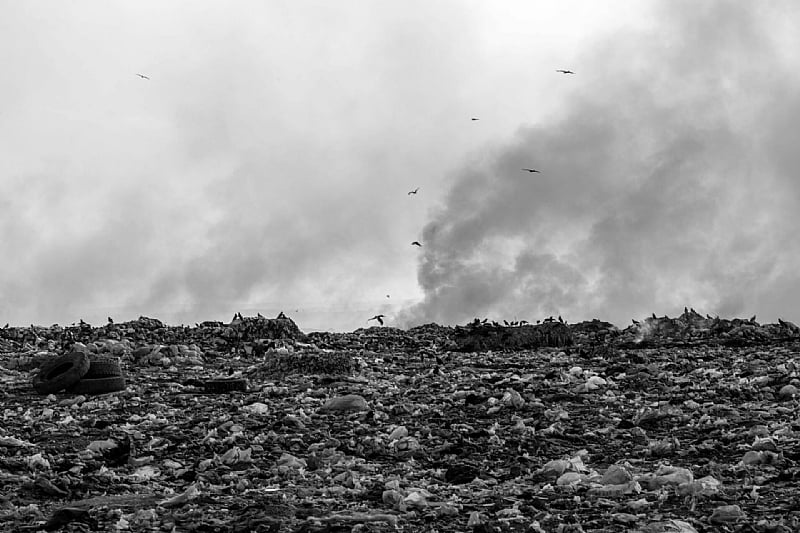I traveled from Tamale to Accra in August 2005 in search of greener pastures. I was very young; too young to be hired by anyone, but determined to survive. I followed other street children to Agbogbloshie because I heard that many people from the north, especially Dagbanli speakers, were working there collecting and selling scrap. That’s how I ended up staying and working in Old Fadama–Agbogbloshie for nearly 20 years.
Life in Agbogbloshie
If anyone had told me I could survive even one night in Agbogbloshie, I would have doubted it. I was met with the heavy, choking smell of the Odaw River and Korle Lagoon, which surround the area. The air was thick with black smoke from burning wires and plastics at the scrapyard across the river. It was hard to breathe but I had nowhere else to go.
At first, I walked around holding my nose, trying to avoid inhaling the toxic air. But soon I realized I couldn’t live without breathing, and the people around me had somehow learned to live with it.
What gave me hope was meeting other young people from my region. I found five boys from my home community who had already been living in Old Fadama. They welcomed me warmly and gave me space in their small wooden kiosk where they all slept. They also told me that my older brother who had left home years earlier was living with them and would soon return.
He came back the next Sunday and took me to the scrapyard the following day. I was too young to follow the older boys outside Accra to collect scrap, so they asked me to join the “burning side”; the area where people burned wires to extract copper. In exchange for helping, I could keep some of the copper.
That’s how I began my journey in the e-waste world.
Learning to Burn
My first tasks were fetching water and sand for cooling burning wires and helping carry
other people’s copper for small fees. By the second week, I was handling iron rods, turning burning wire piles, sprinkling water to cool the plastic, and knocking off ashes to expose copper.
At first, it seemed like a normal way to earn a living. But one day, after a long shift, I returned to our kiosk exhausted. I tried to nap, but I woke up with a severe headache, chest pain, and difficulty breathing. I was bedridden for a month.
There were no health centers, no clinics, no support. My friends said it was normal, all newcomers go through it. I had no choice but to accept it.
Back to Work – A New Way
As soon as I felt slightly better, I returned to the scrapyard. In Agbogbloshie, survival depends on work. Everything costs money: bathing, eating, using the toilet, even drinking water. During my illness, I lived on leftover food and often went hungry. So when I could move again, I had to work.
But this time, I didn’t go back to the burning site. I joined another young man who pushed a four-wheel cart through Accra, collecting metal scraps from homes, offices, and dumpsites to resell at Agbogbloshie. This became my new path.
Why E-Waste Is a National Problem
Ghana’s electronic and electrical goods market is growing fast. But most of what we import are used electronics labeled as “home used,” or cheap, low-quality products with short lifespans. These electronics quickly end up as waste.
Over the last 10 years, the volume of e-waste has increased significantly, flooding the scrap markets. But this waste is mostly handled by untrained and unprotected youth, using crude methods that pollute the air, water, and land.
This is no longer just a community issue. It’s a national problem. We now have domestic, office, and commercial e-waste mixed together. With the rise of electric vehicles and smart devices, the danger could become even worse in the near future.
Ghana urgently needs a national strategy to manage this growing crisis.
The Way Forward
Although Ghana has passed the Electronic and Hazardous Waste Control and Management Act and created an E-Waste Fund, very little practical progress has been made. Most of the real work is still being done by informal youth, with no protection or support.
The government must take a bold step and formalize the e-waste sector through a public- private partnership that includes youth scrap workers and startups.
Here’s what needs to happen:
Provide training for safe recycling methods Support young people with tools, machines, and protective gear Help startups like TechWaste Solutions Ghana Ltd to formalize and scale e-waste businesses Promote green job creation through the E-Waste Fund and national youth support programs
The people working in Agbogbloshie have already created jobs for themselves. What they need now is support, structure, and safety.
Final Word
I did not choose to work in e-waste, poverty pushed me there. But today, I choose to become a voice for change in Ghana’s e-waste economy. My hope is to help turn pain into purpose, and pollution into opportunity.
Agbogbloshie taught me survival. Now, I want to help Ghana learn sustainability.
Alhassan Ibn Abdallah
Graduate Student | KNUST & GCTU
Email: [email protected]


